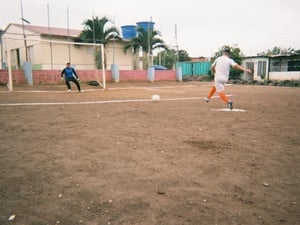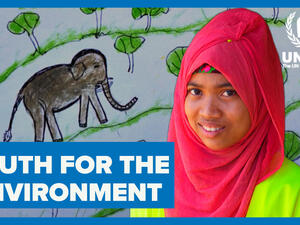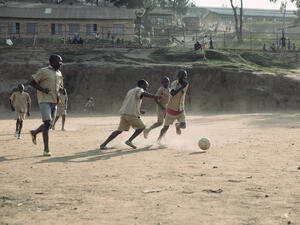A test of speed, strength, skill and horsemanship

A test of speed, strength, skill and horsemanship
Haji Gada Muhammed sits on a cushion in a splendid white parahan tunban, a traditional Afghan long-shirt and loosely plaited trousers made of linen. A grey turban is wrapped around his head, perfectly modeled from years of practice in wearing the nearly six yards of silk.
Now over 60 years old, he still retains fresh memories of the Afghanistan he fled over 40 years ago, as if it were yesterday.
“I remember how it looked when I left,” he recalls. “I can see the green pasture in Kunduz and Badakhshan that I was familiar with. I can remember feeling lost and not knowing when the ordeal of conflict would end, or if I’d be able to take my herd back into the valley near my home again, sing, be free from fear.”
Though having found refuge in Pakistan, he is saddened that Afghans continue to struggle to find peace and security in their homeland.
“I can only raise my old hands in supplication and pray for the restoration of peace and prosperity in my country. I want to be able to re-live the happy moments of tranquillity I knew in my childhood.”
Bringing the community together through sport
Sport, he believes, got him through a lot in his life and helped him build up social connections with the host community in Pakistan. “Local communities had open hearts and warmly took us in,” he remembers.
Being far from home, he wanted to keep his culture and identity alive. It was through the sport of buzkashi – a traditional Afghan and Central Asian horseback sport – that he was able to do this.
Haji Gada Muhammad describes the sport as a test of speed, strength and horsemanship.
“It’s not just a tug-of-war among horsemen over a sewn-up goat carcass. It’s the skill, strength, speed, cunningness of the horseman that wins. It’s rooted in a more traditional way of life in the part of Afghanistan I come from.”
Spurred on by Haji Gada Muhammads’s enthusiasm for buzkashi, local communities in Quetta also gradually participated in tournaments over the years and formed their own teams.
This dedication to the sport has led also to a number of invitations to hold buzkashi exhibitions at popular festivals in Pakistan. Today, many shields of appreciation sit together proudly with photographs of tournaments on a table in Haji Gada Muhammad’s house.
Age has not diminished his love of sport; he continues to organize tournaments every year, as well as Afghan wrestling on Fridays. Unfortunately, these have been halted temporarily due to COVID-19.
He wants buzkashi to be an Olympic sport, though acknowledges that “there might have to be some changes, like using a sack instead of the traditional goat.”
Hope for the future of Afghanistan’s youth
Haji Gada Muhammad has great faith in the youth of Afghanistan, and it is through sport that he has tried to play a positive role in supporting them.
Most of the riders and wrestlers that take part in the sports he organizes are youth.
For Haji Gada Muhammad, sports are important not only to tie communities together, but also as a lifeline for youth and a way to keep them from harmful activities.
As an elder within the Afghan community, he has been reflecting more and more on the life of young Afghans today.
“They have immense potential and can bring peace and prosperity to the country eventually,” he says. Afghanistan has one of the youngest populations globally, with 47% under the age of 15.
“Education is important for this generation of Afghans... I understand the pressures that young people are under. I can only urge them to do their best to obtain an education and to develop their skills and capacities. My advice: be law abiding and remember your roots. One day we will be needed to rebuild our country.”
Erwin Policar, UNHCR’s Head of Sub-Office in Quetta, believes that Haji Muhammad Gada has reason to hope for Afghan youth.
“UNHCR helps support investments in refugee youth. Nowadays, we see Afghan children attending Pakistani schools and receiving the same education. Accredited education is important, and we’re hopeful that more opportunities will be available to young Afghans as they progress with their education.”
Policar is also calling for more support for youth. “We have a Solutions Strategy for Afghan Refugees, part of which focuses on the need to support education and livelihoods and skills training in host countries like Pakistan. Support is needed to build more classrooms when young Afghans attend Pakistani schools, or when they take skills training. Pakistan has done a lot. But there’s a need for international support to do more.”
As we end the interview, Haji Gada Muhammad says he is looking forward to when he can re-start sporting activities. He’s planning to receive the COVID-19 vaccine, which Pakistan is making available to Afghan refugees.
When asked if he’ll be watching the Olympics, he says “of course.”
When we ask which sport, he smiles and replies: “Will they have buzkashi?”









